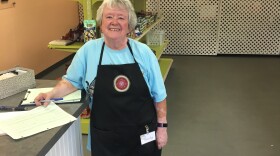Ed Kabotie is a third-generation artist and musician from the Hopi and Tewa tribes. His music has deep ties to his culture and the lands of his people, as well as environmental justice and other issues faced by many Native Americans. He fronts the Flagstaff reggae band Tha ‘Yoties. KNAU’s Ryan Heinsius profiles Ed Kabotie for the latest installment in our series Eats and Beats: stories about food and music. Just a heads up, there’s a little bit of strong language in this piece.
Ed Kabotie: The earliest inspirations of my life came from the cultural side. In my culture everyone’s a musician, everyone’s an artist. Everybody sings, everybody dances. So, in a sense Native cultures are kind of built on performing arts. We don’t look at it that way at all, because these are religious activities, they’re prayers, but when we pray we sing and we dance. Our ceremony is very choreographed. Our songs are very specific. And so all of those kind of contributed to my musical interest.

EK: I get scared when I play for my own people. I get really intimidated. It’s funny. And I think part of that is just because, that’s who my music is for. When I write, I write about our experiences, or my experiences within the culture or I write speaking about the things that have impacted us like industrial mining and so forth. And so I think that when I play for my own people it’s so important for me that they understand what I’m doing and where my heart is coming from in it. I probably tend to overthink it and get a little bit nervous because of it. And I probably don’t have those issues when I step into the greater culture just because when I step into a show that’s not my own people I feel my people with me. I feel them and their voices and their message and their heartbeats. You know, I have some really special support from the people at home.

EK: In all honesty, we’re pissed off. And we have damn good reason to be pissed off. Because by and large, the Native American people are the ones that suffer in the Colorado Plateau. We’re the ones, for instance, that suffer the uranium sickness. We’re the ones that suffer the depletion of our water table. We’re the ones that don’t have running water and electricity in our homes—not that we always want it. Some of refuse, but those of us that do, the water that comes out of our faucets is undrinkable because of arsenic poisoning contamination that has taken place that’s there somewhat naturally, but also because of irresponsible mining not to mention again the uranium contamination in the water. So there’s a lot that we’re angry about.

EK: That’s what our music is about. That’s what our music tries to bring attention to. But we’re not trying to cram things down people’s throats. If you ever come to a ‘Yoties show, it’s fun, it’s whimsical, it’s dance music. We’re a reggae, dance party band: irie-Zona-reggae-rock. That’s what we play. And we play a lot of classic rock tunes—Steve Miller, Led Zeppelin—but we reggae-fy them. We say, we Yoti-fy them. We also come from a culture that, who even though in our songs sometimes, they’re instructive, sometimes they’re rebuking, but they’re always meant to make our hearts happy and I think that’s the way we approach shows. We approach them as a spiritual endeavor. And even though we’re going to drop some bombs, as far as information about the plight of the people and the lands of the Colorado Plateau, we’re also going to put a smile on people’s faces.







